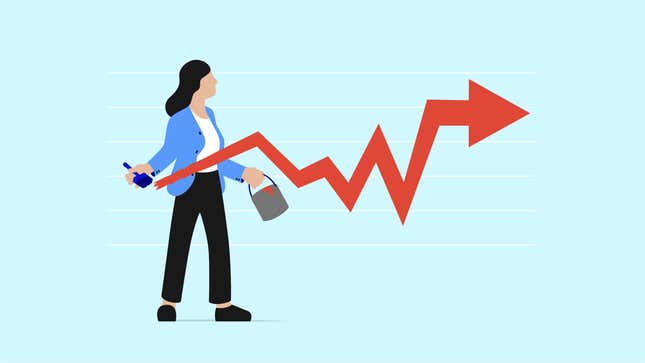

Call her the founder-whisperer: Invesco’s chief global market strategist Kristina Hooper has become an authority on what makes the next generation of entrepreneurs tick. Her conversations with inventors and pioneers in new industries—documented in the popular online series Innovation Now—have yielded insights about everything from healthcare robotics to brick-and-mortar retail. That expertise on the frontline of market disruption has also made her a regular guest on shows like Yahoo! Finance, Bloomberg Markets, and CNBC.
In the QZ&A below, Hooper shares some of the top takeaways she’s gleaned from her relationships in the start-up world, helping to shed light on how trailblazing companies are responding to the challenges of today, while also rewriting the future of commerce and culture.
Q: In which categories or industries today are you seeing the most creative ferment in terms of business solutions to big problems? What burst of activity has most surprised you this year?
A: The pandemic was a moment of real ‘creative destruction’ where solutions were created to solve big problems. Companies learned how to hold meetings, and schools learned how to hold classes on Zoom and other Internet video platforms. People learned how to exercise from home with the help of Peloton and Mirror. And pharmaceutical and biotech companies raced to find a vaccine for Covid-19, in many instances collaborating with each other, or even repurposing existing drugs for use as therapeutic treatments for Covid-19. In recent years, pharma and biotech companies have streamlined the process to systematically repurpose drugs.
We also have seen a huge increase in new business applications thus far in 2020, and many of the applications were for companies created to solve problems caused by the pandemic. I can’t say I am completely surprised, but I am thrilled to see how quickly the business world has pivoted to solve the problems at hand.
Q: One of the innovators spotlighted in Invesco’s Innovation Journeys is Trey Brown, the 14-year-old apparel designer behind Spergo. Do you feel there are fewer barriers to entry than ever before for entrepreneurs? What’s driving that greater access?
A: There are fewer barriers to entry, based on two drivers. One, demand for innovation. Investors are looking for the next great tech investment ideas. And two, a recognition and almost a desire for less-experienced entrepreneurs. There has been a paradigm shift; age and tenure used to matter in business, but now modernity and ideas are desirable.
Q: What’s the single most critical resource for an ambitious entrepreneur?
Q: Where are innovators today finding inspiration for their ideas?
A: Through the simple act of seeing problems and solving them. I think of the Robert Kennedy quote, ‘Some men see things as they are and ask why. I dream of things that never were and ask why not.’ That really describes today’s entrepreneurs, starting with Elon Musk.
Q: You recently spoke with Dawn Dickson, the founder of the automated retail platform PopCom. What trends do you expect to see increasingly adopted in retail in the coming years?
A: Greater use of data to customize the retail experience, even in physical stores. Companies are increasingly recognizing the benefits of data, from enabling more targeted advertising to improving profit margins. For example, knowing customers better enables companies to more appropriately stock the shelves of a store in a particular town. It allows for a surgical approach to retail sales as opposed to a blunt instrument approach.
Q: Walk us through your media diet when it comes to collecting intel on investing in cutting-edge businesses in information tech, communication, and healthcare.
A: I read The Wall Street Journal, The Economist, Financial Times, and Investor’s Business Daily. I follow entrepreneurs and tech leaders on Twitter and appreciate the musings of various academics. But the reality is that I learn the most by talking directly to professionals in those industries. They often have their finger on the pulse and have great insights about cutting-edge products.
Q: What factors will be most important in driving innovation over the next five years?
Q: What are the similarities and differences you see between the previous generation of innovators—Apple’s Steve Jobs, Amazon’s Jeff Bezos—and the latest wave, like the founders of the AI-powered sports training app HomeCourt?
A: The biggest difference is that the current generation has old guard entrepreneurs as role models. Gates, Jobs, and Bezos paved the way, demonstrating the transformative power of innovation. And so current entrepreneurs are standing on the shoulders of these giants as they become giants.
Q: How are global companies like Facebook, Google, and eBay staying nimble and maintaining that original spirit of disruptive thinking and action?
A: I believe they are looking ahead while also looking over their shoulders. The David Halberstam book The Reckoning illustrates the dangers of 800-pound gorillas in a particular industry becoming arrogant and self-satisfied. A successful company must always be looking ahead, while worrying about companies behind it catching up.
Q: Take a 30-year-old American start-up founder today. They’ve experienced 9/11, the Great Recession, unprecedented technological change, now a global pandemic and another huge economic disruption. How have the sum of these events influenced the rising generation, and what will it mean for the ideas they concept and the business models they use?
A: All these traumatic events have given the Millennial generation a great dose of resilience, and that is a critical characteristic for successful entrepreneurs. It has also hopefully offered examples of Schumpeter’s ‘creative destruction’–the concept that new ideas and great things can emerge from destruction.
Q: When you’re talking to start-up founders across the spectrum, what’s the one thing you often hear that gives you confidence in them? What’s the one thing you hear that gives you doubts?
A: They have a vision for their company and that certainly generates confidence. When they are unable or unwilling to recognize downside risks, then I have my doubts. It’s certainly great for entrepreneurs to be optimistic, but they also need to be realistic, especially about their idea or their company.
Q: What’s one industry or category in which we’ll witness the most innovation-led change within the next five years?
A: Retail, especially brick-and-mortar, because it’s under intense pressure. Margins are tight and could become tighter, so innovation is needed.
To learn how you can be an agent of innovation and access the companies helping build for the future, explore Invesco QQQ ETF.
NOT FDIC INSURED | MAY LOSE VALUE | NO BANK GUARANTEE
There are risks involved with investing in ETFs, including possible loss of money. Shares are not actively managed and are subject to risks similar to those of stocks, including those regarding short selling and margin maintenance requirements. Ordinary brokerage commissions apply. The Fund’s return may not match the return of the Underlying Index. The Fund is subject to certain other risks. Please see the current prospectus for more information regarding the risk associated with an investment in the Fund. Investments focused in a particular sector, such as technology, are subject to greater risk, and are more greatly impacted by market volatility, than more diversified investments.
Shares are not individually redeemable and owners of the Shares may acquire those Shares from the Fund and tender those Shares for redemption to the Fund in Creation Unit aggregations only, typically consisting of 50,000 Shares.
This does not constitute a recommendation of any investment strategy or product for a particular investor. Investors should consult a financial professional before making any investment decisions.
Invesco is not affiliated with Quartz, Spergo, HomeCourt, or PopCom.
As of February 23, 2021, Invesco QQQ had 8.51% exposure to Amazon.com Inc., 11.83% exposure to Apple Inc., 0.65% exposure to Zoom Video Communications Inc., 0.33% exposure to Lululemon Athletica Inc., 0.29% exposure to Peloton Interactive Inc., 3.31% exposure to Facebook Inc., 3.19% exposure to Alphabet Inc. (Google), 0.33% exposure to eBay Inc., and 0.0% exposure to Popcom and HomeCourt. Holdings are subject to change and should not be considered buy/sell recommendations.
This content should not be construed as an endorsement for or a recommendation to in the Companies discussed herein. The Companies listed herein are not affiliated with Invesco.
Invesco Distributors, Inc. NA2100